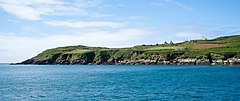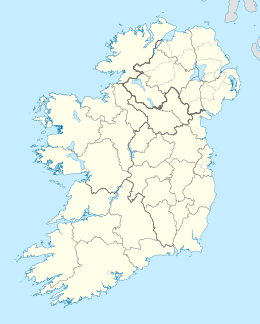Clear Island or Cape Clear Island (officially known by its Irish name: Cléire, and sometimes also called Oileán Chléire)[2][3] is an island off the south-west coast of County Cork in Ireland. It is the southernmost inhabited part of Ireland and had a population of 110 people as of the 2022 census.[4]
Native name: Cléire | |
|---|---|
 View from the island's South Harbour | |
| Geography | |
| Location | Carbery's Hundred Isles |
| Coordinates | 51°26′N 9°30′W / 51.433°N 9.500°W |
| Area | 6.7 km2 (2.6 sq mi) |
| Length | 5.2 km (3.23 mi) |
| Width | 2.4 km (1.49 mi) |
| Highest elevation | 160 m (520 ft) |
| Highest point | Cnoicín an tSeabhaic |
| Administration | |
Ireland | |
| Province | Munster |
| County | Cork |
| Barony | Carbery West |
| Demographics | |
| Population | 110 (2022)[1] |
| Pop. density | 18.6/km2 (48.2/sq mi) |
| Additional information | |
| Official website | capeclearisland |
| The island is a Gaeltacht | |
The island is a Gaeltacht area (Irish-speaking area),[5] in which Irish is spoken on a daily basis. The nearest neighbouring island is Sherkin Island, which is 2 kilometres (1 nautical mile) east of Cape Clear Island.
The island is divided into east and west halves by an isthmus called the Waist, with the North Harbour to the landward side and the South Harbour on the seaward side.[6] Ferries sail regularly from the North Harbour to Schull and Baltimore on the mainland. The South Harbour is a popular berth for yachts and pleasure boats during the summer months.
History
editArchaeological sites on the island include a prehistoric cup-marked stone (currently in the island's museum), a fulacht fiadh at Gort na Lobhar, a neolithic passage tomb at Cill Leire Forabhain, several standing stones around the island, a promontory fort at Dún an Óir, and a signal tower dating from the Napoleonic Wars.[7][8][9] The island also has a number of early Christian sites, and is reputed to be the birthplace of Saint Ciarán of Saigir. The ruin of a 12th-century church, which has protected national monument status, is close to the main pier in the North Harbour.[10]
The island had a population of over 1,052 before the 19th century famine, but the current population of Cape Clear is less than one-eighth of that figure. The island's primary school was built in 1897, and was visited by President of Ireland Mary McAleese in 1998.[citation needed]
Cape Clear was originally supplied with electricity produced by diesel generators on the island, but around 1995 these were replaced with a submarine power cable from the mainland.[11]
|
|
| |||||||||||||||||||||||||||||||||||||||||||||||||||||||||||||||||||||||||||||||||||||||
| Sources: Central Statistics Office. "CNA17: Population by Off Shore Island, Sex and Year". Retrieved 12 October 2016. and "E2021 - Population of Inhabited Islands Off the Coast 2011 to 2016 (Number) by Islands, CensusYear and Sex". Retrieved 27 November 2020.[permanent dead link]. | |||||||||||||||||||||||||||||||||||||||||||||||||||||||||||||||||||||||||||||||||||||||||
Culture and language
editThe island is officially identified as a Gaeltacht (Irish-speaking) area. According to the 2016 census there were 145 people over the age of 3 living on the island, with 62% claiming to be able to speak Irish and 27% saying they spoke Irish daily outside the education system.[12][13]
The population of the island increases in the summer months as students visit the local Irish Colleges, Coláiste Phobal Chléire and Coláiste Chiaráin.[14] Students stay in local houses or dorms and improve their spoken Irish as part of the immersion courses within the Gaeltacht.
Every first weekend of September, the island hosts the Cape Clear Island International Storytelling Festival. The festival has been running annually since 1994.[15]
Wildlife
editSeals, basking sharks and dolphins are often found in the surrounding waters, while sea pinks and honeysuckle are common plants on the land.[16] Cape Clear is home to a lighthouse and a bird observatory. Cape Clear is popular with bird watchers and at certain times of the year is home to many species of migratory birds as its climate is milder than the mainland and thus more attractive.[17] Bird life includes black and common guillemots, cormorants and storm petrels.
References
edit- ^ Population of Inhabited Islands Off the Coast (Report). Central Statistics Office. 2023. Retrieved 29 June 2023.
- ^ "Cléire / Clear Island (island or archipelago, civil parish)". logainm.ie. Irish Placenames Commission. Retrieved 16 October 2019.
- ^ "Cléire / Cape Clear (electoral district)". logainm.ie. Irish Placenames Commission. Retrieved 16 October 2019.
- ^ "Interactive Data Visualisations | CSO Ireland". visual.cso.ie. Retrieved 29 November 2023.
- ^ "Irish Language and the Gaeltacht - CSO - Central Statistics Office". www.cso.ie. Retrieved 29 November 2023.
- ^ David Walsh, Oileáin: A Guide to the Irish Islands (Pesda Press, 2004; ISBN 0953195694), p. 64.
- ^ "Archaeological & Historical Sites on Cape Clear Island". Cape Clear Museum. Archived from the original on 4 November 2017.
- ^ "Cape Clear Heritage Centre". Cape Clear Cooperative. Retrieved 6 April 2015.
- ^ "Cape Clear Island - Oileán Chléire". Fáilte Ireland. Retrieved 6 April 2015.
- ^ Archaeological Inventory of County Cork, Vol 1 (West Cork). Office of Public Works. 1992. ISBN 9780707601755.
- ^ "Cape Clear Museum and Archive". Capeclearmuseum.ie. Archived from the original on 4 November 2017.
Electricity and house water was a 'luxury' that only arrived on the island in the 1970s and a submarine cable bringing electricity from the mainland 8 miles away arrived only about 1995.
- ^ "ArcGIS Web Application". airomaps.nuim.ie. Retrieved 31 December 2020.
- ^ "ArcGIS Web Application". census.cso.ie. Archived from the original on 28 November 2017. Retrieved 31 December 2020.
- ^ "Irish Colleges". capeclearisland.ie. Retrieved 25 August 2020.
- ^ "Cape Clear Storytelling". capeclearstorytelling.com. Retrieved 16 October 2019.
- ^ John Akeroyd, ed. (1996). The Wild Plants of Sherkin, Cape Clear and adjacent Islands of West Cork. Sherkin Island Marine Station. ISBN 9781870492584.
- ^ "Birdwatching Cape Clear". BirdWatch Ireland. Archived from the original on 15 March 2015. Retrieved 5 April 2015.
Further reading
edit- Cape Clear Island, Éamon Lankford, 1999
- Ghostwritten, David Mitchell, 1999
- Staideár Cuimsitheach Teangeolaíoch ar Úsáid na Gaeilge sa Ghaeltacht, Committee of Community, Rural and Gaeltacht Affairs, 2007
- The Night Swimmer, Matt Bondurant, 2012
